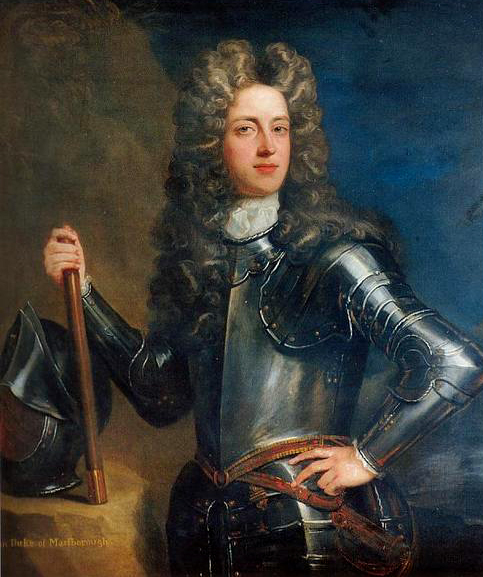For those of us who lived through the Second World War and remember how Charles de Gaulle (1) , from his exile in London joined Winston Churchill and fought the Nazis, or for those of us born more recently who have studied the role of those two leaders in that war, there is a clear image of the British Prime Minister, Churchill, and the leader of the Free French, de Gaulle, forming an alliance (albeit an uneasy one) to defeat Hitler and the Axis powers. But if we go back in time two hundred years, we find an earlier Churchill whose reputation as a British national hero was built on defeating France. Both Churchills occupied the same residence.
The earlier Churchill was in fact John Churchill, the 1st Duke of Marlborough, (whose father was also named Winston Churchill). Blenheim Palace was constructed in Oxfordshire, England as a gift from a grateful nation for John Churchill’s role in defeating both France under Louis XIV (the greatest British victory since the Battle of Agincourt), and Bavaria at the Battle of Blenheim (the English version of Blindheim in Austria) . Almost two centuries later, Winston Churchill was born in Blenheim Palace in 1874.
John Churchill, Duke of Marlborough
Blenheim Palace, England
Blenheim Palace is a now a World Heritage Site and a popular tourist attraction.
At a young age John Churchill was a companion of King James II, the last Catholic monarch to reign over the Kingdoms of England, Scotland, and Ireland, during the king’s banishment to Europe, until William, Prince of Orange invaded England in 1688. At that point, John Churchill switched sides to support the Protestant William against the Catholic James. As part of William III's coronation honours, Churchill was created Earl of Marlborough. He participated in the War of Spanish Succession and led the British army in triumph in four of the biggest battles of the 18th century, including the Battle of Blenheim in 1704.
These victories came at the cost of widespread slaughter. Marlborough was notorious for his avarice and suspected of prolonging the war for his personal benefit. He became the richest man in Britain. Fortunately, his plan to invade France and to march on Paris was thwarted principally by Queen Anne, who fell out with Churchill’s wife, who had been the Queen’s best friend. But the song named after him, Malbrouck s’en va-t-en guerre, continued to frighten French children long after his death.
http://www.youtube.com/watch?v=_448PL3ZGPA&feature=channel
Sir Winston Churchill is best remembered for his role as Britain’s leader in World War II, but he won the Nobel Prize for Literature, principally for his History of the English Speaking Peoples. Churchill also wrote a four-volume book about his famous ancestor: Marlborough: His Life and Times.
Here is a reference in that work to John Churchill: “Until the advent of Napoleon, no commander wielded such widespread power in Europe. Upon his person centred the union of nearly twenty confederate states. He held the Grand Alliance together ….He rode into action with the combinations of three-quarters of Europe in his hand.”
Earl Charles Spencer, (brother of the late Princess Diana) has also written a book about the Duke of Marlborough, apparently under two titles: Battle for Europe: How the Duke of Marlborough Masterminded the Defeat of the French at Blenheim (Hardcover) and Blenheim: Battle for Europe (Paperback).
John Churchill ensured his place in posterity for changing the face of European history. But one cannot but wonder if by the values of Western Society today, it is proper to adulate a man who conducted war in such a brutal and ruthless manner as to slaughter large numbers of innocent Frenchmen. Perhaps the military victories of those two residents of Blenheim Palace may be distinguished as follows: the defeat and carnage of the French at Blenheim and elsewhere in 1704 was grounded in religious fanaticism and the lust for power, reflecting Man’s most uncivilized, atavistic instincts, while the 2nd World War was, to use modern parlance, a war of necessity. One may doubt however, if the World War of 1939-1945 will prove to be the war to end all wars, any more than the World War of 1914-1918 fitted that description.
Sources include: “That Sweet Enemy: The French and the British…”
(1) De Gaulle: “When I am right, I get angry. Churchill gets angry when he is wrong. So we were often angry at each other.”
Churchill: "Of all the crosses I have to bear, the heaviest is the Cross of Lorraine."




Aucun commentaire:
Enregistrer un commentaire